試す 金 - 無料
Wet carcass syndrome: a scourge in SA sheep farming
Farmer's Weekly
|September 20, 2024
Wet carcass syndrome continues to take a huge financial toll on South African sheep farmers. Octavia Avesca Spandiel spoke to two experts about the ongoing genetic research aimed at addressing this issue.

Wet carcass syndrome (WCS) is a perplexing condition that significantly impacts the quality of sheep carcasses post-slaughter. The syndrome manifests itself after the slaughtering process, making it difficult to detect and prevent while the animal is alive. This condition poses considerable economic challenges to the sheep farming industry, particularly in South Africa, where it has been a persistent issue since the 19805.
Bhaveni B Kooverjee, a doctoral candidate at the Agricultural Research Council (ARC) researching WCS, and Dr Pranisha Soma, a researcher at the ARC, shed light on this complex syndrome, delving into the clinical signs, potential physiological and biochemical markers, impact on carcass processing, recent research findings and the economic implications of WCS.
"WCS is a condition that is only found in sheep and appears after slaughter. Prior to slaughter, the animal appears normal and unaffected. However, after the 24-hour cooling period, the carcass appears to have a sticky, slimy layer coating the entire outer layer of the carcass," explains Kooverjee. This condition makes the carcasses difficult to handle and its appearance affects its marketability
PHYSIOLOGICAL AND BIOCHEMICAL MARKERS
Detecting WCS before slaughter is a significant challenge. "WCS appears post-slaughter, there are no symptoms prior that we can use as identifying markers to say that this animal will be susceptible to WCS. It appears at the carcass stage," notes Kooverjee. This absence of early markers complicates efforts to manage and prevent the syndrome effectively. The presence of a slimy layer on the carcass significantly hampers processing. "The carcass, as it goes through the processes in the abattoir, becomes very difficult for the abattoir people to cut and clean because it's so slippery. The tools even slip off, posing a challenge for the abattoir workers working on the carcass," explains Kooverjee.
このストーリーは、Farmer's Weekly の September 20, 2024 版からのものです。
Magzter GOLD を購読すると、厳選された何千ものプレミアム記事や、10,000 以上の雑誌や新聞にアクセスできます。
すでに購読者ですか? サインイン
Farmer's Weekly からのその他のストーリー

Farmer's Weekly
Pastry delights and cupcakes
The versatility of pastry in baking and cooking is best flaunted by two vastly different recipes appealing to the sweet and savoury tooth, while a novel way to bake those Christmas-themed cupcakes will also go down well.
4 mins
December 5-12, 2025
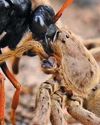
Farmer's Weekly
Specialised spider-hunting wasps
Wasps are apex predators of the insect world and have developed many survival strategies. One group of wasps focuses on hunting spiders to provide a source of food for their larval offspring
2 mins
December 5-12, 2025
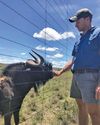
Farmer's Weekly
From bulls to boardrooms: farming part-time as a professional
Maintaining a farm requires time, resources, and commitment. Farming part-time while being fully employed elsewhere can seem daunting and risky. Although it certainly presents unique challenges, it is feasible for some. Koot Klopper and Herman van Heerden spoke to Henning Naudé about how excellent time management and the delegation of resources, as part-time farmers, successfully keep their farms productive.
5 mins
December 5-12, 2025

Farmer's Weekly
Holy Shiitake: mastering the science of gourmet fungi
Mushroom production is inherently the practice of expanding mycelium. But since wanted and unwanted fungi flourish under the same circumstances, a mushroom farmer's biggest challenge is ensuring the right fungi prevails. Lindi Botha reports on Rory Brooks' learning curve.
9 mins
December 5-12, 2025
Farmer's Weekly
No more 'secret' price hikes?
'Secret' electricity price hikes in South Africa have been curbed in a game-changing court ruling, explains Felix Dube, lecturer in the Department of Law at the University of Venda.
4 mins
December 5-12, 2025
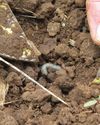
Farmer's Weekly
The cutworm scourge, and how to control it
The dominant cutworm, Agrotis segetum, is causing renewed, costly damage to South African maize, soya bean, and sunflower.
5 mins
December 5-12, 2025
Farmer's Weekly
Legislative gap requires a rethink on biosecurity controls
Since the dawn of democracy, the agriculture sector has cemented its place as one of the essential and trusted pillars for economic growth, job creation, and foreign earnings in South Africa.
2 mins
December 5-12, 2025

Farmer's Weekly
From kitchen experiments to a thriving meat empire
What started as an after-hours kitchen project in the Truter household has grown into the fully fledged meat empire Deli-Co. Brothers Pieter and Hendri Truter told Glenneis Kriel how they turned a local favourite into a multigenerational family business.
7 mins
December 5-12, 2025
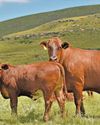
Farmer's Weekly
Brushing up on your 'cow speak'
Experienced stockman and cattle judge Willie de Jager spoke to Sabrina Dean about some of the basics of reading cattle behaviour and how best to handle these animals.
8 mins
December 5-12, 2025
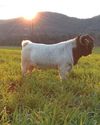
Farmer's Weekly
Corporate day job fuels farming dream
Marius Smit lives in the middle of Gauteng in Centurion and spends his workdays in the fast-paced high-stress corporate sector as a group forensic head for Discovery.
5 mins
December 5-12, 2025
Listen
Translate
Change font size

